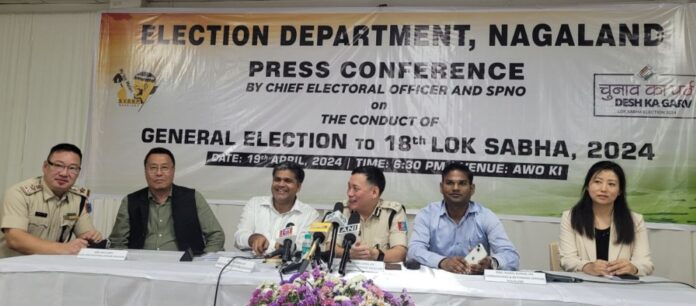In the northeastern state of Nagaland, the recently concluded electoral process has been hailed as a triumph for democracy, with the Chief Electoral Officer (CEO) commending the peaceful conduct of elections. Against the backdrop of a region often characterized by political complexities and security challenges, the successful completion of the electoral process in Nagaland stands as a testament to the resilience of democratic institutions and the commitment of stakeholders to uphold the sanctity of the electoral process.
The Chief Electoral Officer of Nagaland, tasked with overseeing the electoral machinery and ensuring the smooth conduct of elections, has lauded the efforts of election officials, security personnel, political parties, and the electorate for their role in maintaining peace and order throughout the electoral process. Despite the inherent challenges posed by the region’s terrain, demographics, and socio-political dynamics, the electoral process in Nagaland unfolded with remarkable efficiency and tranquility.
One of the key factors contributing to the peaceful conduct of elections in Nagaland was the meticulous planning and coordination among various stakeholders. The Election Commission of India (ECI), in collaboration with state authorities, implemented comprehensive security arrangements, including the deployment of security forces, to prevent any untoward incidents and ensure the safety of voters and polling personnel.
Moreover, proactive measures were taken to address concerns related to electoral malpractices, voter intimidation, and logistical challenges. Voter awareness campaigns, sensitization programs, and outreach initiatives were conducted to educate voters about their rights and responsibilities, thereby empowering them to participate in the electoral process with confidence and conviction.
The cooperation and support extended by political parties and candidates also played a pivotal role in maintaining the peaceful atmosphere during the elections. Political leaders across party lines adhered to the code of conduct prescribed by the ECI, refraining from engaging in inflammatory rhetoric or resorting to unethical campaign practices. Instead, they focused on articulating their vision and engaging with voters on issues of significance, thereby enriching the democratic discourse.
The electorate of Nagaland, known for its active political engagement and civic consciousness, also deserves commendation for their role in ensuring the peaceful conduct of elections. Despite the challenges posed by the ongoing COVID-19 pandemic, voters turned out in significant numbers to exercise their franchise, demonstrating their unwavering commitment to democracy.
The successful completion of the electoral process in Nagaland is a significant milestone in the state’s democratic journey, marking yet another instance of peaceful and orderly elections. It underscores the maturity of Nagaland’s political landscape and the collective resolve of its people to resolve differences through dialogue and democratic means.
Beyond the immediate implications for Nagaland, the peaceful conduct of elections in the state sends a positive message to the entire region and the nation as a whole. It reaffirms the resilience of democratic institutions in the face of adversity and serves as a beacon of hope for other states grappling with electoral challenges.
Looking ahead, it is imperative for stakeholders to build on the momentum generated by the successful conduct of elections in Nagaland and work towards further strengthening democratic processes and institutions. This entails addressing issues such as voter education, electoral reforms, and inclusive governance to foster greater trust and confidence among the electorate.
Additionally, efforts should be made to address the underlying socio-political grievances and aspirations of the people of Nagaland, thereby addressing the root causes of conflict and promoting sustainable peace and development in the region. Through inclusive and participatory governance mechanisms, stakeholders can build consensus, bridge divides, and pave the way for a brighter and more prosperous future for Nagaland and its people.
In addition, the Chief Electoral Officer of Nagaland’s commendation of the peaceful electoral process reflects the collective efforts of stakeholders to uphold the principles of democracy and ensure the integrity of the electoral process. The successful completion of elections in Nagaland serves as a shining example of the resilience and vibrancy of India’s democratic ethos, inspiring confidence and hope in the power of democratic governance.




